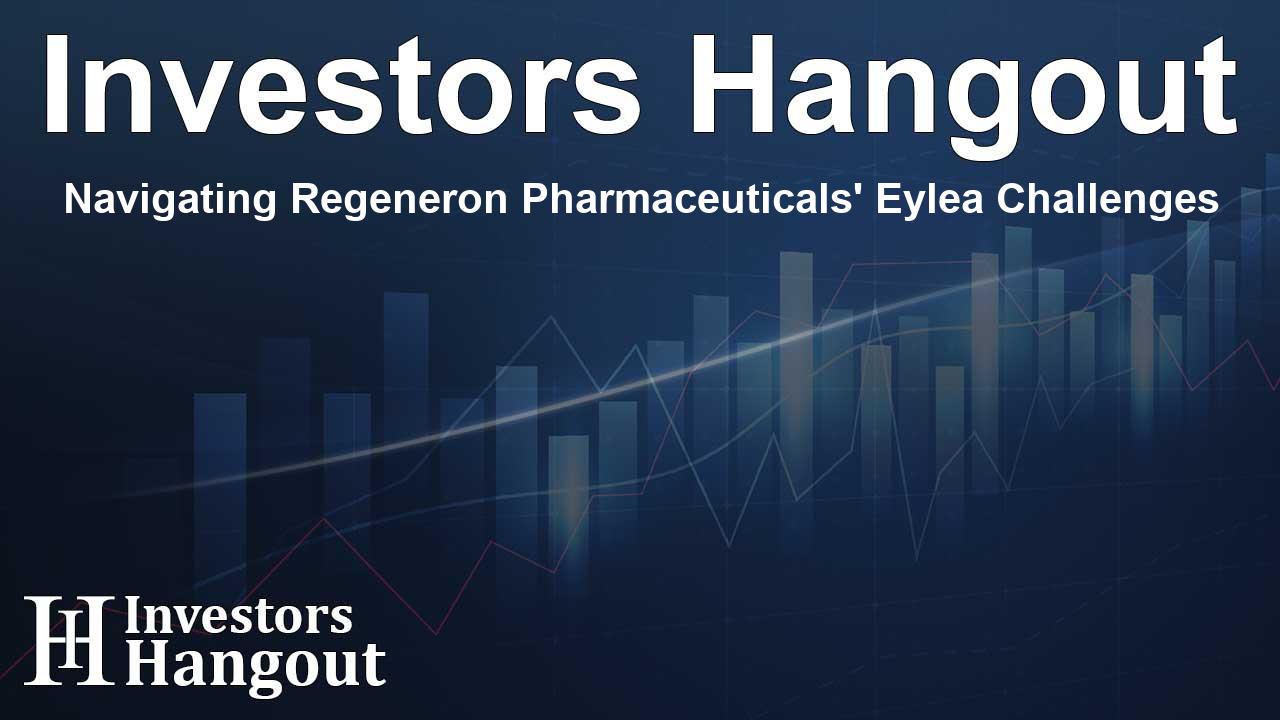Navigating Regeneron Pharmaceuticals' Eylea Challenges

Understanding the Situation with Regeneron Pharmaceuticals
Regeneron Pharmaceuticals (NASDAQ: REGN) has shown impressive performance recently, driven by its strong financial outcomes and promising advancements in clinical trials and regulations. However, the biotech titan is currently facing challenges with its critically acclaimed drug, Eylea, which treats the eye condition known as wet age-related macular degeneration.
Recently, news regarding Eylea led to a significant drop in Regeneron’s share price, falling nearly 5% in just a day—a considerable shift for a company of its stature. This raises questions for potential investors: What’s happening with Eylea, and should one consider investing in Regeneron at this moment?
Background Information on Eylea
Regeneron holds exclusive U.S. rights to Eylea and collaborates with Bayer for international markets. The first major challenge for Eylea emerged with the FDA's approval of Vabysmo, a competing treatment for wet AMD produced by Roche (OTC: RHHBY), which received authorization in early 2022.
In light of this, Regeneron strategically introduced a higher-dose (8 mg) formulation of Eylea, which the FDA approved, allowing for fewer injections annually without compromising effectiveness. In the second quarter, Eylea and its HD formulation saw U.S. sales totaling $1.53 billion, a slight increase of 2% from the previous year, with Eylea HD contributing $304 million. Overall, Regeneron's revenue reached $3.55 billion, marking a 12% year-on-year increase, with U.S. Eylea sales comprising about 43% of that revenue.
Emerging Biosimilar Competition
Regeneron has been active in safeguarding Eylea’s patent due to increased interest from biosimilar developers. In August, the FDA granted approval to Pavblu, a biosimilar targeting the original Eylea formulation.
This approval does not automatically mean Pavblu will enter the market immediately. A recent court ruling favored Amgen (NASDAQ: AMGN), the producer of Pavblu, as Regeneron was unsuccessful in obtaining a preliminary injunction to delay Pavblu's launch. Although this ruling only pertains to Pavblu, it raises concerns since other biosimilars are also on the FDA’s approval list. Regeneron has filed an appeal, but uncertainty remains until the court proceedings conclude.
Looking Ahead for Regeneron Pharmaceuticals
Predicting the outcome of Regeneron's legal battle with Amgen is challenging. In a worst-case scenario, if Amgen chooses to launch its biosimilar at risk, meaning financially vulnerable if it loses against Regeneron, investors may ponder the consequences for Regeneron.
There’s a possibility that Regeneron’s higher-dose Eylea could be cannibalizing the sales of the original formulation, as many patients opt for fewer injections. Additionally, another significant growth driver for Regeneron is Dupixent, a treatment for eczema, which it jointly markets with Sanofi. In the second quarter, Dupixent’s global revenue surged 27% from the previous year, totaling $3.56 billion. Recently, Dupixent gained approval for treating chronic obstructive pulmonary disease (COPD) in the U.S., is expected to bolster annual sales by several billion dollars, supporting Regeneron's revenue growth.
While losing patent exclusivity on Eylea would be detrimental, Regeneron can pivot by leaning on the success of Eylea HD and Dupixent. Furthermore, Regeneron boasts a robust pipeline featuring over 50 developmental programs, particularly focusing on advancing in oncology. This suggests that Regeneron remains a company ripe with potential nonetheless.
Investors shouldn’t lose faith in Regeneron due to recent setbacks with Eylea. For those interested in biotechnology investment opportunities, now may be a prime time to acquire shares at a discounted price as the company navigates these turbulent waters.
Investing Considerations for Regeneron Pharmaceuticals
Before making an investment in Regeneron Pharmaceuticals, it's essential to conduct thorough research and analysis. Keep in mind that while Regeneron presents opportunities for growth, particularly through its other successful products and vast development pipeline, investors must assess the inherent risks tied to Eylea’s current situation and competition.
Frequently Asked Questions
What is the current status of Eylea?
Eylea is facing competition from a new biosimilar called Pavblu, and Regeneron is engaged in legal actions to protect its market position.
How significant is Eylea to Regeneron’s revenue?
Eylea represents approximately 43% of Regeneron’s total revenue, reflecting its critical importance to the company’s financial health.
What are the future prospects for Regeneron Pharmaceuticals?
Regeneron has a robust pipeline with over 50 programs and successful drugs like Dupixent driving revenue growth potential.
Should investors consider buying Regeneron stock now?
With the current dip in stock prices due to Eylea issues, some analysts believe it may be a strategic time to invest in Regeneron for long-term prospects.
What role does Dupixent play in Regeneron’s growth?
Dupixent has shown significant sales growth and recently gained new approvals, making it a critical growth driver alongside Eylea.
About Investors Hangout
Investors Hangout is a leading online stock forum for financial discussion and learning, offering a wide range of free tools and resources. It draws in traders of all levels, who exchange market knowledge, investigate trading tactics, and keep an eye on industry developments in real time. Featuring financial articles, stock message boards, quotes, charts, company profiles, and live news updates. Through cooperative learning and a wealth of informational resources, it helps users from novices creating their first portfolios to experts honing their techniques. Join Investors Hangout today: https://investorshangout.com/
Disclaimer: The content of this article is solely for general informational purposes only; it does not represent legal, financial, or investment advice. Investors Hangout does not offer financial advice; the author is not a licensed financial advisor. Consult a qualified advisor before making any financial or investment decisions based on this article. The author's interpretation of publicly available data shapes the opinions presented here; as a result, they should not be taken as advice to purchase, sell, or hold any securities mentioned or any other investments. The author does not guarantee the accuracy, completeness, or timeliness of any material, providing it "as is." Information and market conditions may change; past performance is not indicative of future outcomes. If any of the material offered here is inaccurate, please contact us for corrections.